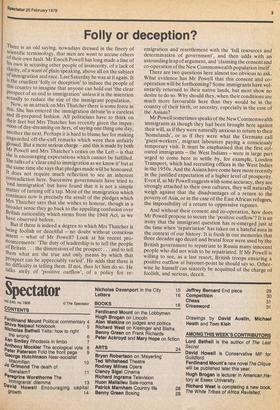Folly or deception?
There is an old saying, nowadays dressed in the finery of scientific terminology, that men are wont to accuse others of their own fault. Mr Enoch Powell has long made a line of his own in accusing other people of insincerity, of a lack of clarity, of a want of plain speaking, above all on the subject of immigration and race. Last Saturday he was at it again. It Is the cruellest 'folly or deception' to induce the people of this country to imagine that anyone can hold out 'the clear Prospect of an end to immigration' unless it is the intention actually to reduce the size of the immigrant population. Now, as an attack on Mrs Thatcher there is some force in this. She has entered the immigration debate'in a careless and ill-prepared fashion. All politicians have to think on their feet but Mrs Thatcher has recently given the impre ssion of day-dreaming on hers, of saying one thing one day, another the next. Perhaps it is hard to blame her for making unguarded off-the-cuff remarks which were then unfairly glossed. But a more serious charge — and this is made by both Mr Powell and Mrs Thatcher's critics on the Left — is that She is encouraging expectations which cannot be fulfilled. She talks of a 'clear end to immigration as we know it' but at the same time she says that pledges made will be honoured. It does not require much reflection to see an inherent Contradiction here. Successive governments have tried to end immigration' but have found that it is not a simple Matter of turning off a tap. Most of the immigration which continues now is precisely the result of the pledges which Mrs Thatcher says that she wishes to honour, though in a broader sense they go back to the appalling confusion over British nationality which stems from the 1948 Act, as we have observed before.
But if there is indeed a degree to which Mrs Thatcher is being foolish or deceitful no doubt without conscious intent — what of Mr Powell? Look at his recent pronouncements: 'The duty of leadership is to tell the people of Britain. . . the dimensions of the prospect. . . and to tell them what are the true and only means by which that Prospect can be appreciably varied'. He adds that there is no difficulty in telling them. If not, then let him do so. He talks airily of `positive outflow', of a policy for re emigration and resettlement with the `full resources and determination of government', and then adds with an astounding leap of argument, and 'claiming the consent and co-operation of the New Commonwealth population itself'.
There are two questions here almost too obvious to ask. What evidence has Mr Powell that this consent and co operation will be forthcoming? Some immigrants have vol untarily returned to their native lands, but most show no desire to do so. Why should they, when their conditions are much more favourable here than they would be in the country of their birth, or ancestry, especially in the case of the Asians?
Mr Powell sometimes speaks of the New Commonwealth immigrants as though they had been brought here against their will, as if they were naturally anxious to return to their 'homelands', or as if they were what the Germans call `guest-workers', migrant labourers paying a consciously temporary visit. It must be emphasised that the first coloured immigrants — the West Indians — were in large part urged to come here to settle by, for example, London Transport, which had recruiting offices in the West Indies in the 1950s. And the Asians have come here more recently in the justified expectation of a higher level of prosperity. Even if, as Mr Powell suggests with some accuracy, they are strongly attached to their own cultures, they will naturally weigh against that the disadvantages of a return to the poverty of Asia, or in the case of the East African refugees, the impossibility of a return to oppressive regimes.
And without their consent and co-operation, how does Mr Powell propose to secure the 'positive outflow'? It is an irony that the immigrant question has re-emerged just at the time when `repatriation' has taken on a hateful aura in the context of our history. It is fresh in our memories that three decades ago deceit and brutal force were used by the British government to repatriate to Russia many innocent people who did not wish to be repatriated. If Mr Powell is willing to see, as a last resort, British troops ensuring a positive outflow at bayonet-point he should say so. Otherwise he himself can scarcely be acquitted of the charge of foolish, and serious, deceit.


































 Previous page
Previous page